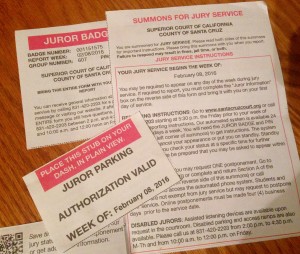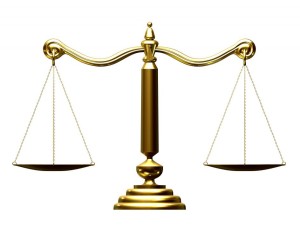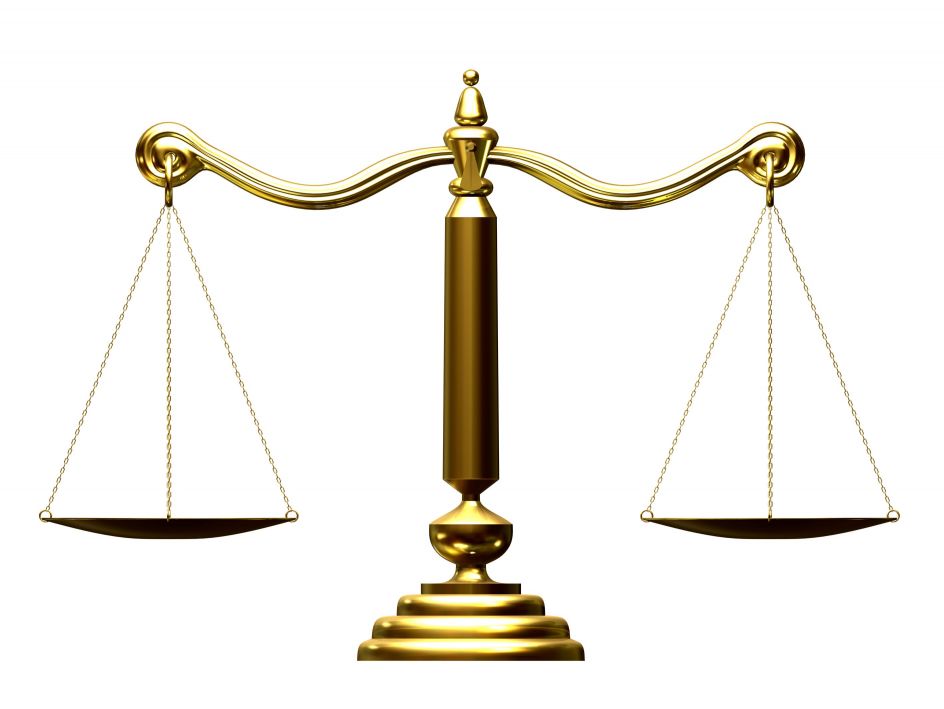 You’ve Got Mail!
You’ve Got Mail!
I should have taken my blood pressure the day my jury summons arrived. I remember feeling lightheaded, and the hair on the back of my neck felt prickly. It wasn’t the first summons I’ve received, of course. I’m a committed voter, and I always change my address when I move, so I’ve never been difficult for the government to track down.
It wasn’t as if I had the slightest idea what serving on an jury would be like. Or that I was doing anything that couldn’t be postponed a few days or even longer if I were selected. Or even that there was even much likelihood I would be selected. In nearly 50 years of being a registered voter and several more as a licensed driver, I’ve only had to report for duty about three times, and I was either not called or excused (or perhaps more correctly, recused) each time.
So why did I feel that something bad was going to happen?
The Tao of Trial by Jury: We Want the Right, But Not the Obligation
Well, it turns out I’m not the only one who feels that way. The internet is filled with articles about how to get out of jury duty; what happens if you just don’t show up; how you can fly under the radar so you don’t get called, and many web sites (including some in Canada and Japan) that address those questions.
WikiHow.com has produced a very complete document designed to help people avoid jury duty. Part One is titled Getting Out of Jury Duty and Part Two is Getting Yourself Dismissed From a Jury. The writer is unapologetic in his approach and after sitting through two days of jury selection at the beginning of last week, I suspected that several of our potential jurors had read the guide. They successfully left the courthouse without serving, Service Complete stamped on their summons.
In 2012 an Irish Criminal Justice student wrote a dissertation titled Jury Service: The Verdict in which he describes a study of public attitudes toward jury service. His findings were that almost no one looked forward to receiving a jury summons, and a sizable minority attempted to avoid jury service, but that when questioned more closely, most citizens admitted they would serve, and interviews post-service showed that they had found it a satisfying experience.
In 2011 Legal Match Law Blog reported on two judges who had called in over 300 people who had not shown up for jury duty: “Jury truancy may come at a high cost. Judges have a lot of discretion to penalize those who spin lies shamelessly and without any fear, as if they are not in the court of law.”
Other surveys have shown that the reason so many of us dread the summons is that we don’t want to deal with the inconvenience, we don’t know much about the process, we may feel that we are vulnerable to attack during or after the trial, and we don’t want to deal with the inconvenience. There are legitimate reasons, of course: we are the only caregiver of a child or a disabled person; we are self employed or have no paid benefits and will lose income during the trial; we have a legitimate conflict of interest or bias that would prevent us being fair.
The system is set up to cope with those situations. Beyond that, the negotiating and posturing that goes on to get out of serving is expensive for us all, but lawyers and judges seem to understand that it is simply part of the process.
But trial by jury is a right of the accused in the United States of America. If juries are not willing to sit, the scales of Justice will not balance. I am retired now, and a grandmother — an elder.  I felt that I must participate, if only so I could hold up my head when talking to my grandchildren. So I cleared my calendar, packed a book and a lunch, and drove to the courthouse as instructed.
I felt that I must participate, if only so I could hold up my head when talking to my grandchildren. So I cleared my calendar, packed a book and a lunch, and drove to the courthouse as instructed.
Settling in
Once the jury pool was called into the courtroom, attorneys for both the prosecution and the defense began a process called Voir Dire. Literally meaning “to speak the truth,” voir dire is a preliminary examination of the prospective jurors, in order to inquire into their competence and suitability to sit on the jury.” Although the judge may ask questions, it is mostly the attorneys who do so. Their goal is to eliminate jurors who may be biased against their side, and choose jurors who are most likely to be sympathetic. Attorneys for each side are allowed to reject potential jurors in two ways. They may dismiss anyone for cause, meaning a reason that is relevant to that person’s ability and fitness to perform jury duty. And they may issue a limited number of peremptory challenges, which are dismissals that do not require a reason. (definitions from The Free Dictionary/Legal Dictionary).
I found the jury selection process fascinating. The attorneys were entertaining — I suspect intentionally so – as they gave various examples of direct evidence and circumstantial evidence, and how they both could be considered in the case we would be hearing. As they were asking their questions of each potential juror (have you served on a jury before? Do you have any relationship to Law Enforcement? Can you uphold a law you don’t agree with?) the attorneys were also instructing the jury. Over and over, each time there was a new group of potential jurors to be questioned, the definitions of the pertinent laws and the way in which they must be applied were explained. Once I was in a jury chair and listening to the judge and the attorneys, my concern about whether or not I wanted to serve had dissipated. Eventually the two-day process, which must have been as deadly for the actors as it was for their audience, was over. Twelve citizens had been selected to serve on the jury, and I was one of them.
Looking Back
The trial took the rest of the week. After that the jury retired to decide on five counts of drug-related charges. When I eventually drove away from the courthouse, my faith in human nature had been confirmed. Everyone on the jury engaged in the process; everyone was respectful of the individuals who did not agree with the majority; everyone listened to reasons, concerns, and confusion. There were three counts on which we did not initially agree; but eventually we did come to consensus.
The jury system is alive and well in Santa Cruz, California. And I actually look forward to receiving my next jury summons.
I love comments — you may add yours by using the form at the bottom of this post. (You can also subscribe to my weekly commentary by filling in the blanks at the top of the post.) See you next week.





i was a young male with a beard and tended too get excused,
and thus never got to be on a jury.
the lawyers tend to have their own algorithm on who
to seat or not seat, and from it was always NOT seat me.
that all is interesting, since i would have tried to be fair,
even tho my impression is people that are guilty tend
to ask for a jury!
What a coincidence. I had jury duty this week but when i called last night to see if I had to show up, the recording said I was summoned back to jury in May. Weird.
I was called a few years back and had to sit through 5 days of Voir Dire. It was a horrible child abuse case so they’d called 200 people in order to sit 12. As grisly as the case was, I found the whole process fascinated. The defendant looked totally creepy. If you looked up child molester in the dictionary there would be a picture of this guy. But–innocent until proven guilty. I felt the weight of responsibility. On the end, I wasn’t called and I was grateful. But I am richer for the experience.
BTW, if I ever find myself on trial, I’d want you on my jury.
Cathy,
That would have been a very painful jury to sit on, I agree. By comparison I got off easily – five counts of drug related charges. But after my experience I wondered if it wouldn’t be a good thing if every citizen had to at least sit through the Voir Dire process as a young person, perhaps even before they are eligible for jury duty, just to understand how the process works. I regret that I never participated when I was younger and fitter; sitting in a jury box all day made my joints cranky.
i was on a jury a LONG time ago and found it quite interesting.
it is a way for the courts to flatten out cases a little,
since if the case is too outrageous,
the jury can get the case settled.
and a local jury can stop a case they feel is
not appropriate for their area.
for example, a local jury may decide against going ahead
against a small drug case where the jury people
also have doubts about that sort of case.
several years ago a case involving race
would be difficult to get a conviction in the South,
but in the N the case would have gone the other way.
This sort of thing would be good or bad
depending on your viewpoint
Interesting ideas, Dennie. I did a little research about this and there was actually a Supreme Court case several years ago in which the right to decide not to prosecute a broken law was upheld. Some laws simply cannot be upheld because the “without a doubt” clause cannot be met.